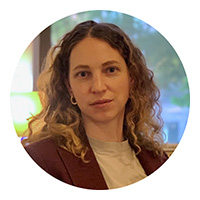Scholars in Residence 2024-25
Graduate Student Fellows
Soo Young Lee
 she/her/hers
she/her/hersCrown Family School of Social Work, Policy, and Practice, CSGS-CSRPC Joint Residential Fellow
Soo Young Lee is a doctoral candidate in the School of Social Work, Policy, and Practice. Grounded in an Asian American and Women of Color feminist praxis, her research engages critical storytelling methods to explore experiences and meanings of political awakening, identity, and solidarity with Asian American and other young people of color.
Her dissertation is guided by inquiry into how young, politically engaged Asian American women in the Chicagoland area spanning a range of ethnic backgrounds, immigrant legacies, political histories, and social locations are moved to work towards addressing the conditions of inequity that impact people’s lives. She draws on reflexive group-based storytelling as both a data collection method and feminist practice of critical care ethics. How do Asian American women’s journeys of politicization illuminate possibilities for critically interrogating, turning from, and healing the racialized and gendered harms of model minority subject formation? How do their political praxes shed light on sites and strategies for building Asian American solidarities that are dynamic, intersectional, and sustainable? Through these explorations, she seeks to illuminate sites of possibility within young people’s social contexts to develop their critical consciousness while tending to their wellbeing.
Jovon M. Moses
 they/them/theirs
they/them/theirsEnglish, CSRPC-CSGS Dissertation Fellow
Jovon M. Moses is a PhD candidate in English at the University of Chicago. Their research spans an array of fields, including trans* and queer studies, Indigenous studies, Black feminist thought, and Black ecologies. Their dissertation project, “Black Transfeminist Ecologies: A Litany of Loose Objects”, explores the ecological as an interstitial site of black, trans*, and indigenous speculation, reworking the conditions of relationality to strain and put pressure on humanist modes of identity and belonging. Through a Wynterian and Berlantian interpretation of race and gender as “code words” for genre, they aim to interrogate the condition of staying in desirous, yet deleterious relation to objects such as these and propose a “loose” association of objects as an otherwise orientation to “making good relation.” The dissertation shores up tensions in Black studies, Indigenous studies at large, and Trans studies, returning to the stymied site of the relational antagonism with renewed fervor for an ecological modality attendant to but not overdetermined by coloniality and slavery.
Alongside their academic work, Jovon maintains an exploratory filmic practice that explores the anarchic capacity of Black Spirit. They hold a B.A. in English and Linguistics from Emory University and an M.A. in English from the University of Chicago.
Katrina Roze Myers
 she/her/hers
she/her/hers Religious Ethics, Dissertation Completion Fellow
Katrina Myers is a PhD candidate at the University of Chicago Divinity School. She works in environmental and religious ethics, and she also engages religious studies, philosophy, feminist theory, human rights law and legal theory, the social sciences, and climate science. Her current work is a response to the need for an ethical theory that is grounded in lived experience and which enables us to both address and make sense of the ubiquitous suffering of the world. In her dissertation, “Compassion and Catastrophe: A Schopenhauerian Response to Climate Change Displacement,” she develops a conceptual framework for addressing the harmful consequences of climate change displacement. She focuses on the two of the greatest sources of suffering for displaced people: extant law and social isolation. She explores how—when guided by compassion and informed by contemporary feminist theory—the law and religious communities can be tools that enable us to cultivate and enact compassion.
Katrina holds a JD and a Graduate Certificate in Women’s, Gender, & Sexuality Studies from Boston University School of Law; a Master’s in Theological Studies and a Graduate Certificate in Religion, Gender, & Sexuality Studies from Vanderbilt University; and a BA in English and Religious Studies from Southern Methodist University.
Malavika Parthasarathy
 she/her/hers
she/her/hers Law School, Residential Fellow
Malavika is a JSD (Doctor of Jurisprudence) candidate at the Law School, where she uses empirical methods to study extra-legal compromises in rape adjudication. Her current project studies how courts respond to rape in the context of pre-existing romantic relationships between the victim and the accused, and the role that illicit compromises between the parties play in determining the outcomes of these cases.
Malavika holds a B.A.LL.B. (Hons.) from National Law University Delhi, and obtained an LL.M. from the University of Chicago Law School. She has worked, written and published in the areas of criminal law, disability justice, laws relating to gender and sexuality, and the business and human rights framework. At the University of Chicago, she has taught reproductive justice and an introductory course on legal reasoning, and will be teaching a course on Disability Justice as part of the Human Rights Graduate Lectureship awarded by the Pozen Center.
Helen Galvin Ross
 she/her/hers
she/her/hers Political Science, Residential Fellow
Helen Galvin Ross is a PhD candidate in the Department of Political Science, concentrating in political theory. Her research draws together the fields of critical theory and political theology with feminist method and concerns. Her work is concerned within the origins and boundaries of what we call “the political,” and the gendered outsides or forms of disavowal—like privacy or the state of nature—that define it. In what ways do borders, boundaries, and walls define our experience, indeed the reality, of politics, and in what ways does precisely this form of definition place exclusion at the basis of political life?
Her dissertation project, "Sacred Precincts: A Feminist Critique of Sovereignty," ranges across political theory, philosophy, and legal theory in order to develop a critique of sovereign forms that depend on these particular mechanisms of exception and exclusion. In what ways does the exclusion of women, reproduction, and the family constitute political power? How might an answer to this question provide new pathways for feminist theorizing and illuminate the nature of sovereignty itself?
Helen received her BA in Government and Legal Studies, with high honors, from Bowdoin College, and her MA in the Social Sciences from the University of Chicago. Her MA thesis was awarded the Earl S. and Esther Johnson Prize for the best Masters thesis in the MA program.
Omar Safadi
 he/him/his
he/him/his Political Science, Dissertation Completion Fellow
Omar Safadi is a PhD Candidate in the department of Political Science at the University of Chicago. His research is anchored in contemporary Lebanon, where he studies the politics of sexuality, sectarianism, and civil war. Based on two years of ethnographic and on-site fieldwork, his dissertation asks the following: what are the political uses and effects of homophobia in Lebanese sectarianism? And what can the Lebanese example tell us about the organizing work of homophobia in religiously plural political orders? Rather than viewing homophobia as consolidating dominant, majoritarian, or authoritarian orders, Omar uses the Lebanese case to show homophobia’s effects on processes of political division and sectarianization: on sub-national group-formation, boundary-fortification, and war-making. Across several episodes of anti-gay political incitement, the dissertation illustrates the ways in which homophobia activates in-group identities (chapter 1), securitizes communal territorial boundaries (chapter 2), produces inter-sectarian federation (chapter 3), and organizes inter-imperial war within and across state borders (chapter 4). It argues that homophobia constellates specific and diachronic problem-spaces around communal violation, geopolitical predation, and the loss of self-determination. Above all, the dissertation attempts to illustrate how homophobia’s articulation in Lebanon depends upon historic and ongoing conditions of civil war, military occupation, and geopolitical intervention.
Omar holds a Master’s degree in Political Science and a BA in Political Science from the University of Chicago. His master’s thesis, “Sectarianism and the Sodomite: Homophobia, Communal Identity, and Globalization in Lebanon,” theorizes homophobia as a technology of sectarian re-entrenchment in Christian Maronite communities.
Yuanxie Shi
 she/her/hers
she/her/hersEast Asian Languages and Civilizations, Residential Fellow
Yuanxie Shi is a PhD candidate in the Department of East Asian Languages and Civilizations, specializing in the intersections of labor and women's history, political economy, and material culture. Her dissertation, "When Embroidery Needles Bested Smoking Chimneys: Gendered Export Lacemaking in Socialist China," explores an uncharted history of socialist industrialization since 1949 and during the Cold War. Rather than focusing on mechanical manufacturing and factory settings, her research examines mass production through labor-intensive craft work by millions of Chinese women, primarily in rural areas. This project reveals the subaltern status of rural women and bridges an overlooked social category in both the socialist hierarchy of values and the international division of labor.
Yuanxie is also concerned with the evolving ecology of craft and women’s work and is committed to analyzing the historical roots of social injustice affecting both women and nature. In Spring 2025, she will teach her own course “Production and Reproduction in Modern East Asia,” which offers a cross-regional and multidisciplinary approach to understanding gendered work and heterosexual norms.
Michael Stablein, Jr.
 he/him/his
he/him/hisEnglish Language and Literature/Theater and Performance Studies, Residential Fellow
Michael Stablein Jr. is a joint-PhD candidate in Theater and Performance Studies and English Language and Literature and a Residential Fellow at the Center for the Study of Gender and Sexuality. His dissertation project, “Boys Will Be Men and Other Consequences," examines the violent dramaturgies of contemporary masculinity through the lens of the post-45 coming-of-age genre. From novel to incel manifesto, from playscript to capitol insurrection, the dissertation bridges genre theory and performance studies to examine the consequential movements from narrative to performance and from genre to gender. Studying the more extreme and violent failures to meet the expectations of masculinity, the project outlines a paradigmatic genre that has proved a relentless cudgel of normative teleology.
He was one of ATHE’s 2022 Emerging Scholars in Performance Studies; a 2022 Fellow in UChicago’s Arts, Science, and Culture Initiative; and his writing can be found in ASAP/J and forthcoming with GLQ and TDR. In addition to his scholarship, he maintains a performance practice which deploys choreographies of masculinity to address questions of repetition, normativity, and identity-formation. He has exhibited and performed in Los Angeles, Philadelphia, New York, and Berlin. He holds a Bachelor's from Florida State University and a Master's from Columbia University of New York.
Abigail Taylor-Roth
 she/her/hers
she/her/hersCommittee on Conceptual and Historical Studies of Science, Residential Fellow
Abigail Taylor-Roth is a PhD candidate in the Committee on Conceptual and Historical Studies of Science at the University of Chicago. Her research uses frameworks and methodologies from feminist science studies to study modern mathematics, with a particular focus on materiality in the production of mathematical knowledge. Her dissertation project focuses on the physical and conceptual tools that 20th century mathematician Benoit Mandelbrot used to advance the study of fractals as rich examples through which to approach the topic of materiality in mathematics more generally. How did Mandelbrot’s access to IBM computing resources, focus on coastlines, associations with mining and oil industries, and ties to Zionist institutions impact the shape and development of fractal geometry? Abigail is broadly interested in bringing forward the political and material aspects of mathematics and committed to building towards the production of scientific and mathematical knowledge that is no longer rooted in militarism, extraction, and carceral technologies. She holds a BA in Women’s, Gender, and Sexuality Studies and Mathematics from Colby College.
Postdoctoral Teaching Fellows and Lecturers
Rhiannon Love Auriemma
 she/her/hers
she/her/hersLecturer in Gender and Sexuality Studies
Rhiannon is a feminist theorist working in the fields of political theory and gender studies. She holds a PhD in Political Science from Northwestern University and an MA in Politics from The New School for Social Research. Her research and teaching focus primarily on intersectionality, feminist politics, critical race theory, and interpretive methods in feminist theory.
Her dissertation, “(Being a) Feminist (is a) Struggle: Intersectional Feminist Politics in the Era of the Women’s March”, focuses on the ways that feminist politics are animated by debates concerning the political demands of intersectionality. The dissertation offers critical interpretations of the work of Kimberlé Crenshaw to trace the development of intersectionality as an analytic with connections to pragmatic uses of civil rights law and juridical understandings of politics. She argues that Crenshaw’s theorization of intersectionality offers us an ambiguous understanding of intersectionality’s politics that leaves open multiple avenues of radical resistance and practices of solidarity. Her current research extends this argument, focusing on Crenshaw’s understanding of racial solidarity in relation to ambivalence. This work attends closely to Crenshaw’s understanding of sexual harassment as a political problem, the relationship between intersectionality and radical feminism, and how Crenshaw’s articulation of sexual marginalization might help us rethink feminist politics in the wake of the #metoo movement.
You can read more about her research at rhiannonlove.squarespace.com
Dana Glaser
 she/her/hers
she/her/hersArts & Humanities Teaching Fellow in English Language and Literature
Dana Glaser is a Fellow in the Arts & Humanities and Center for the Study of Gender and Sexuality at the University of Chicago, where she earned her PhD in English in 2024. she researches and teaches in feminist theory and 20th/21st century American literature. Her research is interested in thinking about the 20th century political and intellectual history of gender, race, and sex in terms of aesthetics, and the history of 20th century literary concepts, such as “nonfiction,” testimony, and propaganda, in terms of epistemology and intellectual history. Her first book project, Abstract, Literal, Reductive: How Feminism Thought takes up the ambivalent persistence of the “Second Wave” as an object of reference for contemporary debate around gender and sex. It argues for a new understanding of 20th century genealogy of gender politics, and the conceptual problems that fall out of it, by reading our habitual descriptions of what’s, in a word, bad about midcentury feminist thought – its too literalness, its totalizing reductions – as aesthetic judgments that respond not to explicit positions or assertions but to style.
Gabriel Ojeda-Sagué
 he/him/his
he/him/hisArts & Humanities Teaching Fellow in English Language and Literature
Gabriel Ojeda-Sagué is a poet and scholar, currently working as an Arts & Humanities Teaching Fellow at the University of Chicago. His research focuses on gay men’s literary and media cultures, with a specialty in the aesthetics of gay pornography. His peer-reviewed work has appeared in the journal Porn Studies, and is forthcoming in TSQ: Transgender Studies Quarterly, and the volume The Sex Scene: Space, Place, Industry from Edinburgh University Press. As a poet, his most recent book is Madness (Nightboat Books, 2022).
His dissertation, "The Gender of Gay Men: Identification, Sexual Cultures, and the Afterlives of the Inversion Model," studies how gay male sexuality has provoked gendered positions, conflicts, and identifications through the 20th and 21st centuries.